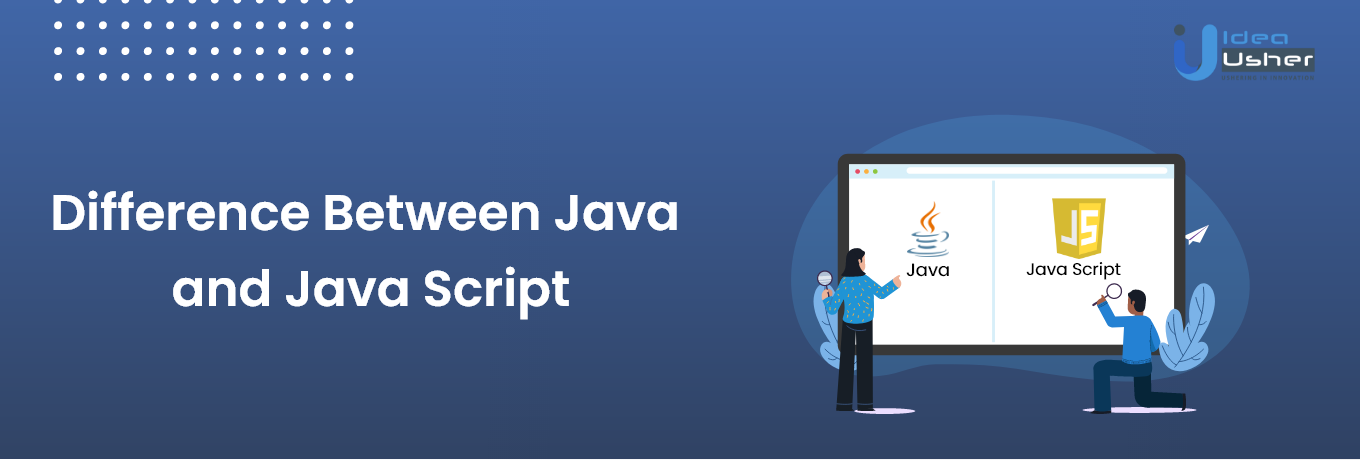Difference between Java and JavaScript: best vs. best
Difference between Java and JavaScript: which is better, and why? We’ll reveal the difference between Java and JavaScript today. The name for both starts with “Java” and confuses many. However, both are worlds apart- as told by Idea Usher experts. And we’re going to tell you just everything you need to know in this regard. Let’s begin.
What is Java?
Java is used for general programming and building logic. Also, Java is a class-based and an object-oriented programming language. It’s a computing program in a nutshell. Once a Java code is written, it can be run anywhere.
Uses of Java
- Development of cloud-based applications.
- Big data analytics.
- Mobile and desktop GUI applications.
- Gaming applications development solutions.
- Enterprise and scientific applications.
What is Javascript?
Web developers use Javascript to create animations on a website. The Javascript programming language has evolved over the years. It acts as a jetpack for interactive websites. Hence, it’s essentially a scripting language for web development.
Uses of Javascript
- Web development.
- Web application development.
- Server application development.
- Mobile application animations
Is there a difference between Java and JavaScript?
The answer is yes! From the definitions so far, we’ve learned that Java is a programming language. On the other hand, Javascript is a scripting language. Both serve distinct purposes, with limited common grounds. There are several differences between Java and Javascript.
What’s the difference between Java and JavaScript?
Let us finally go through the differences between Javascript and Java. In addition to it, we have some tips on how to choose which and when. Read until the end to find out more!
Main difference
The difference between them is that the former is a programming language. In comparison, the latter is a scripting language.
Language base
One of the salient differences between Java and Javascript is the use of objects. Java is an object-oriented language. In contrast, Javascript is an object-based scripting language.
With one of the many differences between Javascript and Java, the latter is prototype-based. The same can’t be said for Java; all changes are made inside classes.
Running environment
Applications made on Java can run anywhere. Remember the “write once, run anywhere“? It holds true here. For Javascript, the run environment is via Server Node.js.
File extensions
All the Java files are with “.Java” extension wherever for Javascript, it is “.js.”
Memory usage
Javascript codes require less storage than Java to be run in an environment. Memory usage is often a major deciding factor when we talk about the difference between them.
Concurrency
Java works with the approach of thread concurrency. Meanwhile, Javascript favors events based on concurrency.
Now we’ve learned the major set of differences between Java and JavaScript. Now let’s see which one to use and when.
When to choose Java?
Let’s look at some cases where the preference of Java should help your next project.
- When you require exceptional support from a global community of members.
- Use Java when you’re looking for rich APIs.
- When you need to make versatile applications that can be run on any device.
- Use java when documentation support requirements are paramount.
When to choose Javascript?
Let’s look at some cases where the preference of Javascript should help your next project.
- Choose Javascript when you need one language for frontend and backend development.
- When you need lightweight codes, use Javascript for smooth executions.
- If you need natural learning to be comfortable and quick, use Javascript.
Summary: What is the difference between Javascript & Java
Javascript is a language preferred by developers for web development. In contrast, Java is used to make applications that require logic. It is a significant difference between the two.
However, both are potent languages used globally to make stunning applications and websites. We hope you finally understood “what is the difference between JavaScript and Java” For more interesting information, check out our other blogs.
